A bill that would allow wiretapping in certain drug crimes has passed the Alabama Senate with amendments and will be sent back to the House for their consideration.
Currently, the only legal method of wiretapping in the state comes through federal law enforcement agencies such as the FBI and DEA. The new legislation sought to provide state law enforcement with the capabilities to intercept communications via phone, internet, and related wire communications.
House Bill 17 (HB17), sponsored by Rep. Rex Reynolds, allows an officer or agent of the law to obtain authorization for a wiretap by submitting a request to the Attorney General (AG). The AG would then review the evidence and, upon determining probable cause, would submit the request to a judge in the district of the alleged crime. The district judge would then confirm the evidence and conclude if the requesting agency has probable cause to request the wiretap.
The bill does not apply exclusively to phone communications. It applies to any electronic information, including internet, photo, and radio communications.
HB17 is also called the Billy Clardy Act. The namesake is derived from a Huntsville law enforcement officer who was killed in an undercover drug bust in December 2019. Clardy was killed while attempting to arrest a man who was there to sell Clardy and others over 100 pounds of marijuana. Reynolds said he believes the proposed wiretapping technology would prevent another death like Clardy's in the future.
State Sen. Tom Butler (R – Madison) presented the bill before the Senate. Oddly, Butler himself had previously introduced an identical bill that was unable to pass the Senate. On Feb. 21, Butler’s bill reached a tie vote in the Senate which was insufficient to pass it through.
According to Butler, the bill would only apply to large drug trafficking operations. Butler repeatedly stated that only a “kingpin” drug trafficker would be eligible for potential wiretapping.
Although the bill does not use the term "kingpin," it does require stringent protocol before wiretapping would be able to proceed.
The bill had several amendments before passing the Senate. One amendment limited the authority of utilizing the wiretapping machines to state law enforcement. Another requires the Attorney General to present an annual report of wiretaps to the legislature. The final amendment put a time restriction on the bill if it is signed into law, meaning the bill’s provisions would expire in 2026 unless extended by the legislature.
The wiretapping would require the use of specialized machines that are manufactured specifically to intercept communications. According to Reynolds, the devices would remain under the care and supervision of the Alabama Law Enforcement Agency (ALEA,) and any agency that desires to use the machines would require the permission of ALEA.
"We have put in a lot of safeguards to ensure that we aren't violating people's freedoms," Reynolds said. "The legislation would operate through a very narrow scope, and we even have included punishments for officers who misuse the machines… like fines, and I think there's something about civil action too."
Despite identical legislation failing the same body in February, the Senate approved the bill with amendments, with the only nay vote coming from Sen. Dan Roberts (R–Birmingham). The Bill will now be sent back to the House for their consideration.
To connect with the author of this story, or to comment, email craig.monger@1819news.com










